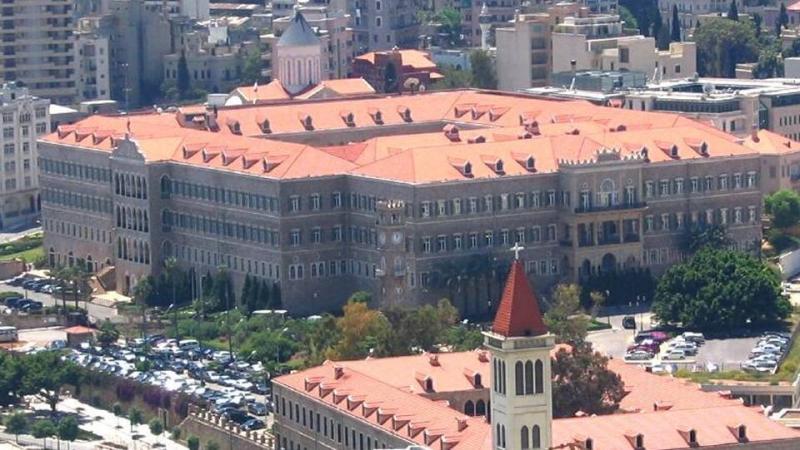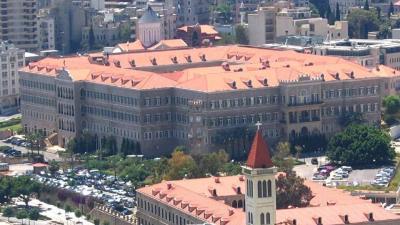As the political debate around the fate of the government and the presidential election continues, Lebanon encountered an initial opportunity to break the comprehensive darkness yesterday. The issue of the Iranian fuel donation resurfaced, as the Lebanese technical delegation in Tehran held "successful" talks with Iranian officials, which will result in a report for Minister of Energy Walid Fayad upon the delegation's return to Beirut tomorrow. Iranian Foreign Ministry spokesperson Nasser Kanaani confirmed yesterday that "the issue of sending free fuel to Lebanon has not been raised," while pointing out that "Tehran is trying to help Beirut solve its economic problems." As usual, Kanaani's remarks aimed to downplay the donation, considering that "talking about it is a lie and not true," before the Iranian embassy in Beirut announced that "ships loaded with Iranian fuel will be ready within a week or two to sail to Lebanon and dock at the port designated by the Lebanese side."
In statements to "Al-Manar" TV, embassy sources noted that the Lebanese delegation in Iran is discussing with the Iranian ministries of energy and oil three topics: assistance to Lebanon in fuel according to an agreement with outgoing Prime Minister Najib Miqati and Minister of Energy and Water Walid Fayad, reforming the electricity network, and constructing power generation plants. Informed sources confirmed to "Al-Akhbar" that "the Iranian side has confirmed its readiness to send a tanker of fuel oil, but it requires a replacement process similar to that of Iraqi fuel to meet Lebanese specifications." Regarding the plants, the sources stated that "the Energy Ministry delegation is not specialized in the plants but in petroleum derivatives," and that "if the Lebanese government is truly serious and sincere, matters are moving in a positive direction."
Meanwhile, the relief resulting from the "cooling" of governmental atmospheres did not dispel fears of obstructing its formation again. It is noteworthy that the effort to resolve the complexities that were hindering the resumption of the outgoing government remains ongoing and has recently emphasized the retreat of Presidents Michel Aoun and Najib Miqati from their ceilings based on the principle of "maintaining the current government with modifications affecting a number of ministers from various sects." While President Aoun's steadfast stance on "his right to name the Druze and Sunni ministers instead of the Minister of the Displaced, Issam Sharafeddine, and Minister of Economy Amin Salam" still reflects the difficulties in reaching the announcement of a new government's birth, informed sources indicated that "Miqati in the past two weeks has become convinced that his stubbornness will be more costly than forming a government that would have a significant share for the President and his team."
As the process of reshuffling names and specifications unfolds, everyone is attentive to the constitutional vacuum should electing a new president fail, stressing that "in this case, Aoun and the Free Patriotic Movement will not confront alone but will position themselves against all Christian authorities, both religious and political, because none of them will accept the caretaker government seizing the powers of the presidency, putting him in a delicate position."
The sources noted that "the past two days have not brought any new developments regarding nominations, while the name of former Minister Saleh al-Ghrayyeb has receded, as it is not appropriate to appoint a provocative figure for Progressive Socialist Party leader Walid Jumblatt, despite the message delivered by Minister Wael Abu Faour to Miqati indicating that Jumblatt would not intervene in the nomination, "but one cannot disregard Jumblatt while the Qabrshmoun issue remains open." The sources added that "President Aoun has not yet revealed the names he wants and is awaiting the Prime Minister's return from abroad."
On another note, in a clear indication of Riyadh's "return" to Lebanon via the presidential election, Saudi Ambassador to Beirut Walid Bukhari visited Clemenceau to meet with Jumblatt to discuss the presidential file. This visit follows disclosed meetings in Paris that included Royal Court advisor Nizar Al-Alula, Bukhari, French presidential advisor Ambassador Patrick Durel, and other French officials to discuss the Lebanese elections. Meeting sources stated that "Bukhari informed Jumblatt about the context of these meetings and communicated the Saudi position on the election, rejecting that the next president be from the March 8 coalition or close to Hezbollah."




